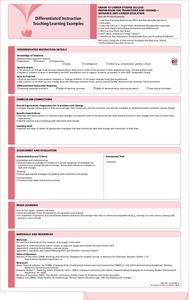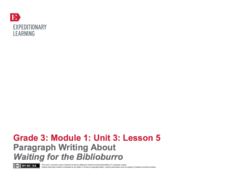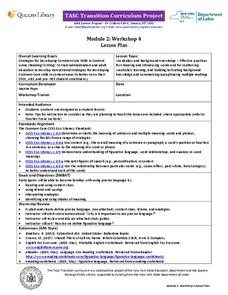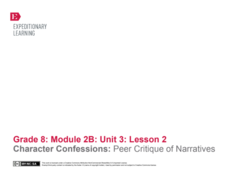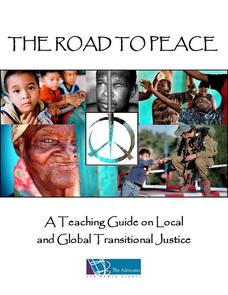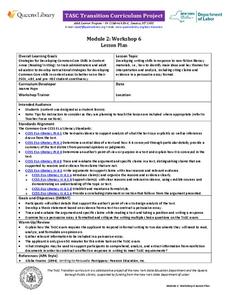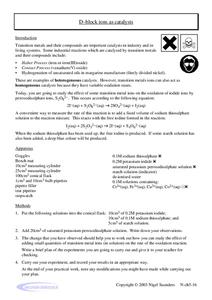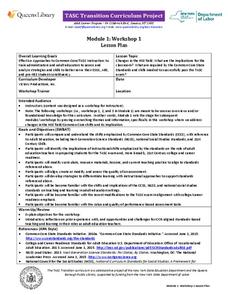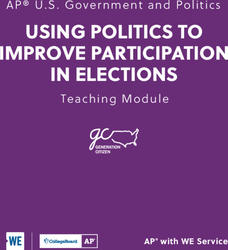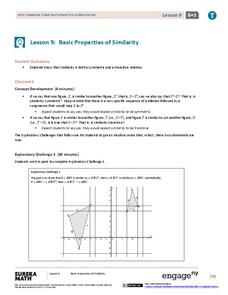EngageNY
Whole Class Model Letter Writing: Organizing Reasons and Evidence and Using Transition Words
Where's the evidence? Scholars practice ordering the evidence and reasons for their class opinion papers by physically sorting them. Next, they work collaboratively to write a body paragraph, using linking words to connect their ideas...
California Department of Education
Transitioning to High School
How do scholars prepare to take their next big step? The second in a series of six career and college readiness activities focuses on making a smooth transition from middle to high school. Groups research the resources available at their...
EduGAINs
Preparation for Transitions and Change— Guidance and Career Education
Every hopeful in your class has gone through some kind of life change, from parents' divorce to a death in the family to moving up into another grade. Encourage them to discuss these changes, the skills they used and acquired...
EngageNY
Storyboard Revision: Managing the Sequence of Events and Using Sensory Details
Mastering techniques from the resource, pupils give life to their writing, revising their storyboards to include sensory details and transitions. To finish, they participate in a peer critique process and use the feedback to further...
EngageNY
Paragraph Writing About Waiting for the Biblioburro
Ask your learners to synthesize what they know about Waiting for the Biblioburro by writing a well-organized paragraph. Young writers focus on using transition words and including specific details in their paragraphs. The plan allows for...
New York State Education Department
TASC Transition Curriculum: Workshop 4
Why is it important to use precise language? Participants explore this question in the fourth activity in a series of 15 on effective instruction. Perfect for all content areas, the activity promotes appropriate language choice through...
Curated OER
Seeing the Image in Imagery: A Lesson Plan Using Film
In our increasingly visual society, it is often difficult for some readers to create a mental picture of a picture created only with words. An image-rich text like F. Scott Fitzgerald's The Great Gatsby can therefore, present a real...
EngageNY
Our Group Readers Theater: Managing the Sequence of Events in Our Script
Go with the flow. Scholars learn how using transition words and phrases helps their scripts flow smoothly. Readers think about connecting each section after determining the sequence for their readers' theater manuscripts from To Kill A...
EngageNY
TASC Transition Curriculum: Workshop 9
Here's a workshop for teachers that rocks the academic world! Using earthquakes as a medium for instruction, educators learn about crosscutting engineering with science. Fun, hands-on, collaborative exercises encourage participants to...
Beyond Benign
Electron Transitions
Ready for a lab with a lot of razzle-dazzle? Young chemists observe flame tests of common salts through an always-popular activity. The updated resource focuses on observation skills, collaboration, and green chemistry practices.
EngageNY
Character Confessions: Peer Critique of Narratives
Shake up the writing process with a peer critique. The second of four lessons in the Grade 8 ELA Module 2B, Unit 3 series first has young writers compare their interpretations of a scene from William Shakespeare's A Midsummer Night's...
EngageNY
End of Unit Assessment: Final Essay
This is just the transition phase. Scholars participate in a mini lesson plan about using transitions in writing. They then have a brief peer critique of the introduction and conclusion paragraphs for their end of unit assessment....
Advocates for Human Rights
A Teaching Guide on Local and Global Transitional Justice
The Road to Peace introduces learners to the concept of transitional justice, a process where nations examine the causes of conflict, identify abuses, and use this information to develop a plan to transition to a society that upholds...
EngageNY
TASC Transition Curriculum: Workshop 6
Is a college education necessary for success in today's world? The class investigates the question, along with others at the end of the sixth workshop in a 15-part series. The instructional activity has four parts with multiple...
EngageNY
Grade 11 ELA Module 2: Unit 1, Lesson 13
Some words leave a lasting impact. After reading paragraph 11 of the text "Of Our Spiritual Strivings," scholars closely examine how Du Bois describes the impact prejudice left on the African American community. They discuss the...
Creative Chemistry
D-Block Ions as Catalysts
In this catalysts worksheet, students use transition metal ions to catalyze oxidation reactions of iodide ions. Students measure the rate of the reactions by measuring free iodine as a product.
New York State Education Department
TASC Transition Curriculum: Workshop 1
Work out your core, Common Core State Standards, through the first workshop in a series of 15 designed for educators. Inquiry-based activities designed for all content areas and grade levels explore the shifts to new standards,...
Curated OER
Representing Data 1: Using Frequency Graphs
Here is a lesson that focuses on the use of frequency graphs to identify a range of measures and makes sense of data in a real-world context as well as constructing frequency graphs given information about the mean, median, and range of...
College Board
Using Politics to Improve Participation in Elections
Instructors new to teaching AP U.S. Government and Politics classes, as well as seasoned veterans, will find this teaching guide an invaluable resource. Using a project-based approach to civics education, the lessons emphasize real-world...
RAND Corporation
Project ALERT
Why do people use drugs? What are the consequences? The alternatives? How can young people resist the pressures to use drugs? The Project Alert drug prevention program provides middle schoolers with the information they need and the...
EngageNY
The Painted Essay for Opinion Writing: Developing a Conclusion and Adding Linking Words
Let's get colorful! Scholars use the Painted Essay technique to analyze and color code the conclusion of a model essay. Working in small groups, pupils then write a conclusion paragraph for their draft editorials about offshore...
EngageNY
Basic Properties of Similarity
Does the symmetry and transitive property apply to similarity? The 10th segment in a series of 16 presents the class with a group of explorations. The explorations have pairs show that similarity is both symmetrical and transitive....
Missouri Department of Elementary
My Feelings
Encourage self-awareness with a lesson that challenges scholars to identify feelings—happy, sad, mad, and scared. Using a feelings thermometer, similar to that of a bar graph, pupils discuss how they would feel in specific scenarios then...
Howard Hughes Medical Institute
Niche Partitioning Activity
Dinnertime on the African savanna is a highly choreographed event! Introduce young ecologists to the concept of niche partitioning through a hands-on activity. Pupils research animal behaviors and use data to develop an understanding of...
Other popular searches
- Using Transitions in Writing
- Writing Using Transitions
- Books Using Transitions
- Sentences Using Transitions


